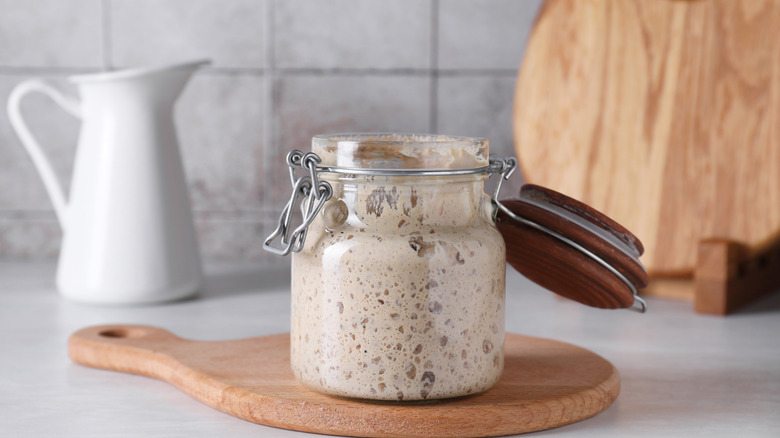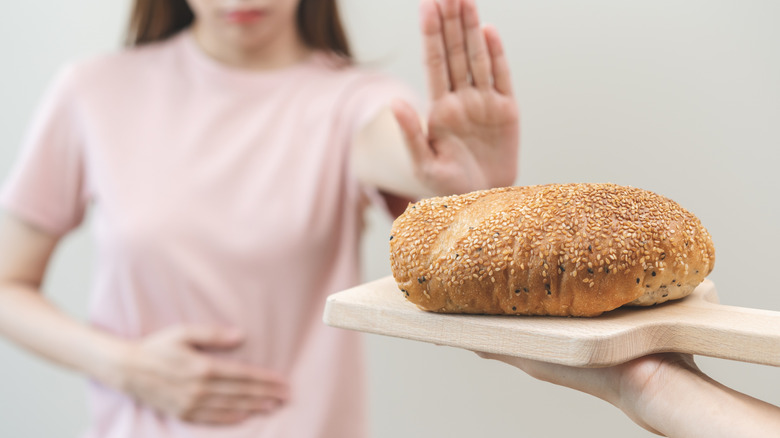Why Sourdough Could Be The Best Type Of Bread To Eat If You Have Poop Troubles
As you're looking through the options of fresh-baked bread at the bakery, many of the breads look alike on the outside. Most are crusty on the outside and somewhat tender on the inside. Sourdough bread distinguishes itself from other types of bread by how it's leavened. Rather than using commercial yeast to make the dough rise, sourdough bread is fermented by a sourdough starter made from flour and water. That's what gives sourdough bread its somewhat sour taste.
Sourdough's natural fermentation process also makes it easier for some people who have problems digesting fermentable short-chain carbohydrates and sugar alcohols known as FODMAPs (fermentable oligosaccharides, disaccharides, monosaccharides, and polyols). Because your gut bacteria ferment these carbohydrates, FODMAPs can cause gastrointestinal problems for some people with sensitive GI tracts or digestive disorders, according to Janel Reeves, registered dietitian at Top Nutrition Coaching, in a Health Digest interview.
"The process of making sourdough bread diminishes FODMAP content," she said. "The good bacteria found in the 'starter' play a big role in breaking down the hard-to-digest FODMAPs during the fermentation process."
How sourdough bread is easier to digest
When you combine flour and water and allow the mixture to sit for a few days, the natural yeasts and bacteria in the flour begin to ferment. Unlike commercial yeast that gives rapid rise to bread dough, sourdough starters take several days until they're ready for breadmaking. During this longer fermentation process, bacteria and enzymes break down some of these short-chain carbohydrates before the bread is baked. That means there are fewer of these FODMAPs to upset the digestive system (per a 2018 review in Frontiers in Microbiology).
Reeves says the amount of FODMAPs found in sourdough bread can depend on how long the starter is fermented and the type of flour used. According to a 2018 review in Foods, sourdough bread can be made with fewer FODMAPs by using certain strains of bacteria during the fermentation process.
Extended fermentation times can lower FODMAPs such as fructans and mannitol, making these sourdough breads easier to digest for people with conditions such as irritable bowel syndrome (IBS). A 2016 study in Alimentary Pharmacology and Therapeutics compared traditional sourdough rye bread and a sourdough rye bread made with a specifically designed fermentation process to lower the FODMAP content even more. When people with IBS ate the lower-FODMAP sourdough bread, they experienced less flatulence, abdominal pain, cramps, and stomach rumbling. They also had less fermentation in the gut.
Should you be eating low-FODMAP foods?
According to Monash University, about one in seven people worldwide suffers from the abdominal discomfort and gas associated with IBS. Although high-FODMAP foods aren't necessarily bad for you, people with IBS might feel their symptoms ease if they eat fewer of these foods. High FODMAP foods include green peas, asparagus, apples, peaches, yogurt, milk, processed meats, legumes, and breads made with wheat, barley, or rye.
Foods that are lower FODMAP are potatoes, zucchini, oranges, pineapple, almond milk, feta cheese, eggs, and sourdough bread. You might consider eating low-FODMAP foods if you have been diagnosed with IBS. "Try sourdough bread with an olive oil-based butter spread, topped with eggs, and served with a side of kiwifruit for a low-FODMAP breakfast idea," Reeves suggested.
You shouldn't follow a low-FODMAP diet if you don't have an IBS diagnosis. Gastrointestinal distress can be signs of other conditions such as celiac disease, inflammatory bowel disease, or bowel cancer. Remember that even though sourdough bread is lower in FODMAPs, it's not gluten-free. Therefore, it's not appropriate for people with celiac disease or anyone with gluten issues.



